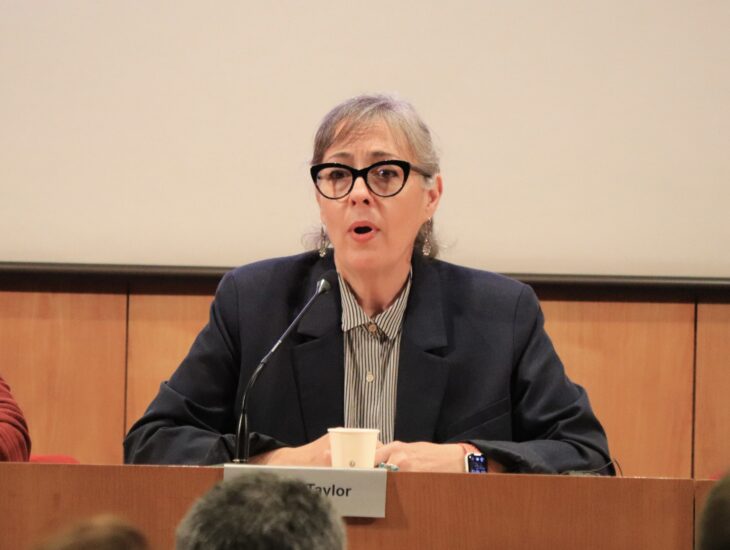The presentation of the book Los ojos del otro. Encuentros restaurativos entre víctimas y ex miembros de ETA took place at the Palau Robert on Wednesday, February 19.
The book describes the meetings that took place in 2011 and 2012 between people who had experienced the direct violence of ETA (either directly as victims or as relatives) and people who had perpetrated acts of violence and are serving time in prison.
Over a hundred people attended the event, organized by ICIP. Among the participants were Maixabel Lasa, ETA victim and one of the participants in the restorative meetings described in the book; Eduardo Santos, mediator in the meetings; Esther Pascual, book and mediation team coordinator; Txema Urkijo, advisor to the Victims of Terrorism Office of the Basque Government; and Rafael Grasa, president of ICIP.
The meetings celebrated between victims and ex-members of ETA – prisoners who have distanced themselves from the organization and have condemned violence – originated as a desire of some of the inmates of the Nanclares de Oca (Araba/Álava) prison to approach their victims, as part of their internal process to separate themselves from the use of violence. The positive response to the initiative by the victims, and the good working relationship between the Victims of Terrorism Office of the Basque Government and the Department of Penal Institutions, allowed for the meetings to take place, according to Urkijo. A total of fourteen meetings between victims and perpetrators took place between 2011 and 2012, and they were all successful.
The role of mediator
The meetings, during which participants were able to freely express themselves, lasted between two and four hours, and were meticulously prepared by a mediation team coordinated by Esther Pascual. The mediator’s job is to transmit trust so that the participants can feel at ease, and the limitations are basic, according to mediator Eduardo Santos: “mutual respect, an attitude of dialogue and an encounter that does not produce more harm than the harm caused previously.”
Esther Pascual explained that the restorative meetings “have provided a response to the needs of the victims – a response they didn’t have during the criminal proceedings – to eliminate hatred, to listen to the harm caused and to recognize the value of forgiveness.” And, according to Pascual, “an ethical responsibility and the need to highlight the existence of dialogue and the significance of restorative justice” made it necessary to publish the content of these experiences.
The testimony of Maixabel Lasa
Maixabel Lasa, widow of Juan María Jáuregui (ex- Socialist prefect of Gipuzkoa/Guipúzcoa, assassinated by ETA in 2000) is one of the victims who participated in these meetings. On May 26, 2011, she sat next to Luis María Carrasco, the person who killed her husband, in the Nanclares de Oca prison. She describes the experience of this meeting in the book Los ojos del otro, and she also gave her testimony in the event celebrated in Barcelona on Wednesday.“I went to the meeting because I’ve always defended, and I continue to defend, that everyone has the right to a second chance,” she said. And she added, “I shook his hand. I was calm, but Luis was quite nervous, and ashamed. And the first thing I asked him was if he knew my husband. He made it clear that he received orders and followed them. He had very low self-esteem and kept on saying that everything he had was bad. And I told him that if we were there, he must have something good.”
Maixabel Lasa said that she participated in the meeting with absolute freedom, she left with a feeling of “inner peace,” and she demands respect for having taken this step, aware that some victims of terrorism have declared their opposition to this initiative.
The program of restorative meetings has been at a standstill since the People’s Party took over the Spanish government. According to Txema Urkijo, “there hasn’t been an outright refusal to celebrate the meetings, but the increasing amount of obstacles and difficulties has led the initiative to a dead end, because Penal Institutions does not believe in rehabilitation.”
21.01.2014




